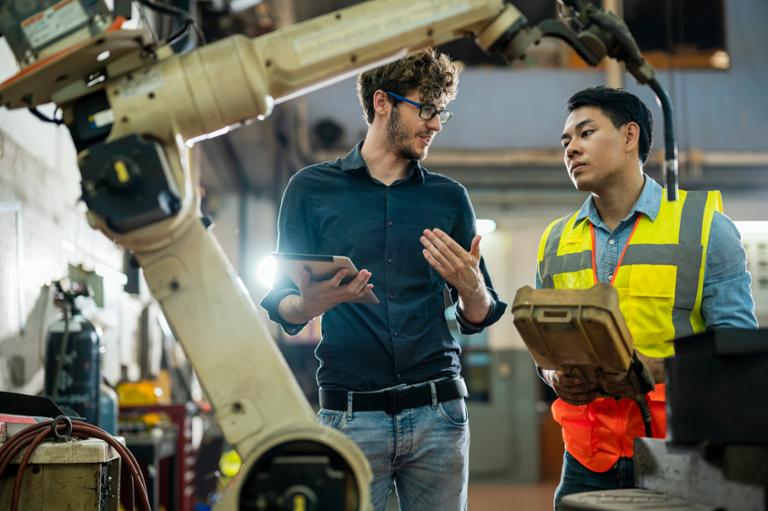Whether it’s food and beverage, plastics, pharmaceuticals or oil and gas, technology professionals need the right skills to keep up with the manufacturing industry.
Manufacturing is experiencing a skills gap, and almost 2.1 million job openings in the United States may remain unfilled by 2030, Deloitte and the Manufacturing Institute revealed in a May 2021 report. In addition, approximately 46 percent of the 360 manufacturing decision-makers surveyed in a December 2022 Visual Components report failed to invest in training programs designed to teach new tech skills to staff.
Perhaps that’s because manufacturing remains behind in adapting its machinery and workflows to cutting-edge tech, according to Artem Kroupenev, vice president of strategy at Augury, a company that offers products that optimize production processes using artificial intelligence (AI).
“Manufacturing has a very physical environment,” Kroupenev said. “And you have to take that environment into account when you try to improve parts of it with technology.”
As some companies bring their manufacturing operations back to the U.S. from China and Southeast Asia, companies struggle with labor costs, reskilling and transferring knowledge from retiring workers, Kroupenev added.
In Salesforce’s Generative AI Snapshot Research Series, a study of 4,000 full-time workers in various industries, 66 percent of respondents said their employees lacked the skills to implement generative AI successfully.
Technologists need to acquire the right skills to prepare for advances in autonomy and generative AI. However, technology is changing white-collar manufacturing jobs more than those that involve physical manipulation of machinery, according to Kroupenev: "It's the data scientists, the process engineers and other kinds of engineering jobs that are dramatically enhanced with AI… The cost of doing some of these tasks has been reduced much more dramatically than the cost of doing maintenance tasks.”
Training is required to digitize the machinery, notes Vignesh Ravikumar, a partner at venture-capital firm Sierra Ventures: “There is demand for digitizing the factory floor, but we’ve found that employees lack training to use the software and machines.”
Using AI to Gain Insights on Machine Health
Technologists should learn how to use generative AI as a copilot or adviser to study how machines operate and help inform decisions within the production process, Kroupenev advises: “For someone going into the manufacturing space, a huge area of opportunity is understanding how you can train and utilize generative AI models and applications to get the right context and to get those meta-level insights across your production.”
He also recommends learning about the personas within generative AI, as well as prompt engineering, which involves creating prompt patterns and structuring text to be understood by a generative AI model. “That is a huge area of opportunity,” he said. “It's like having an additional decision-maker that helps you make business-level decisions across the whole organization.”
Hands-On Experimentation with AI in Manufacturing
Set up hands-on tests that are specific to your industry of manufacturing, Ravikumar advised: “Learn about implementation of robotics and AI software… This is nontrivial and will depend on your environment. Spending time to learn now and even setting up test environments will give you a leg up.”
Tools like ChatGPT help teach technologists how to code or integrate AI into products.
It can also pay to learn how computer vision technology works to help program robots in a factory. “Historically, programming robots to do tasks has been a big challenge, but with improvements in computer vision, it should allow technologists to easily program robots to fit their needs,” Ravikumar said.
Although there are courses that teach generative AI, you can fall behind easily in skills since courses are not standardized and they may be at least six months old, according to Kroupenev. Therefore, you should experiment with it yourself.
Kroupenev recommends pursuing courses in generative AI from services such as Coursera, edX or LinkedIn Learning as a foundation: “That skill set is what's needed today as a catalyst for change across every part of industry, every part of manufacturing.”
With AI features offered as services, technologists will have an easier time experimenting with the new AI tools, according to Patrik Matos, chief product officer and cofounder at DeepHow, an AI-powered, video platform for skilled workforce training.
“AI is more accessible, with various tools and platforms available for experimentation,” Matos said. “Many AI functionalities are being offered as services or APIs, enabling engineers without a deep AI background to integrate AI into their products seamlessly.”



